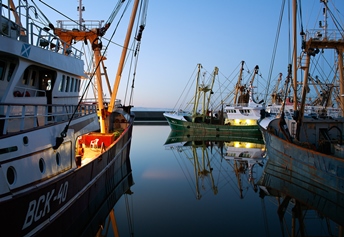EU Fisheries Council and European Parliament Reach Agreement on Future of EU Fisheries Subsidies
BRUSSELS - Today the European Union’s Fisheries Council and the European Parliament secured a deal on the future European Maritime and Fisheries Fund. The EMFF will make available approximately €6.5 billion from 2014 to 2020 to support the EU’s fisheries sector and its maritime policies. It will be instrumental in effective implementation of the reformed Common Fisheries Policy, or CFP, including its targets to end EU overfishing and restore fish stocks.
Adopted on December 10th, the new CFP will come into force on January 1st 2014.
Background:
On October 23th 2013, consistent with their February vote for an ambitious Common Fisheries Policy reform, members of the European Parliament supported a significant shift of additional funds into data collection, control and enforcement, and strengthened provisions to withhold funding in case of non-compliance with the rules of the CFP by member states. However, they unfortunately also voted in favour of subsidies for engine replacements and other measures known to facilitate overfishing. European Parliament votes to improve fisheries data collection, control and enforcement.
“The final agreement between the EU Parliament and Fisheries Council on future EU fisheries subsidies is a mixed outcome. It includes some positive measures, among them more funding for member states to enhance data collection and improve control and enforcement. It will also strengthen provisions to allow funding to be withheld from individual recipients and member states that fail to comply with the rules of the Common Fisheries Policy,” said Uta Bellion, director of The Pew Charitable Trusts’ European marine programme and the OCEAN2012 coalition.
“However, the deal includes subsidies for fishing vessel engine replacement which may increase the capacity of vessels. It also includes subsidies for the temporary cessation of fishing. Rather than contributing to ending overfishing this has the effect of merely pausing it. With this agreement it is now up to member states to choose what they allocate funding to and how ambitious they want to be implementing the reformed Common Fisheries Policy and ending EU overfishing.
- Uta Bellion, director of The Pew Charitable Trusts’ European marine programme and the OCEAN2012 coalition.
 © Corey Arnold
© Corey ArnoldTrawlers up to 24 metres may benefit from new engines..
For more information
1. Report by the new economics foundation on the economic benefits of prioritising investment in fisheries subsidies in data collection and control and enforcement: http://www.neweconomics.org/blog/entry/eu-waters-are-already-overfished-why-would-we-spend-1.6bn-on-new-boats
2. Two hundred scientists call on the European Parliament to end subsidies that fuel overfishing: http://oceana.org/en/eu/media-reports/press-releases/200-scientists-urge-eu-parliament-to-invest-in-rebuilding-fish-stocks
3. Debunking the myths of fisheries subsidies: http://www.ocean2012.eu/publications/102-where-s-the-evidence-debunking-the
4. Historic deal on the reform of the Common Fisheries Policy: http://ocean2012.eu/press_releases/124-historic-agreement-reached-on-eu-fisheries
5. Photo gallery and infographics: http://ocean2012.eu/pages/109-press-gallery and videos: http://www.youtube.com/user/OCEAN2012EU.
6. This press release is also available in: Nederlands (PDF) / Polsku (PDF)











